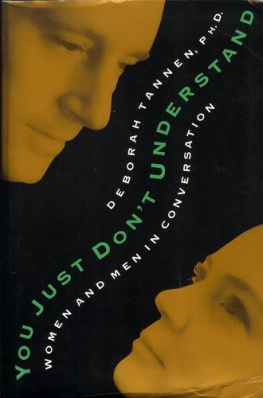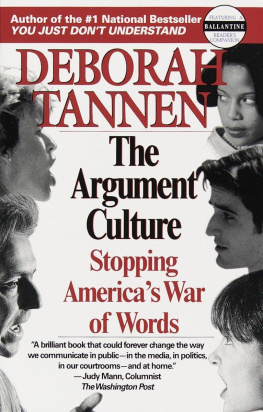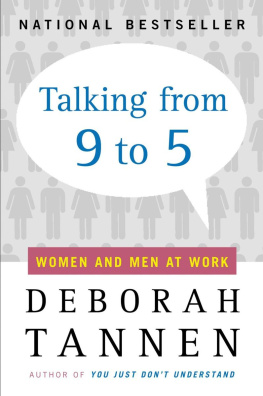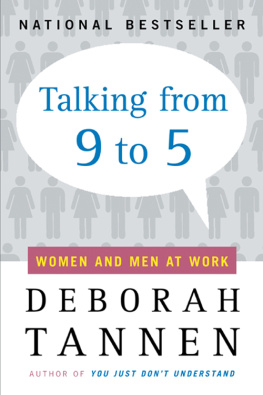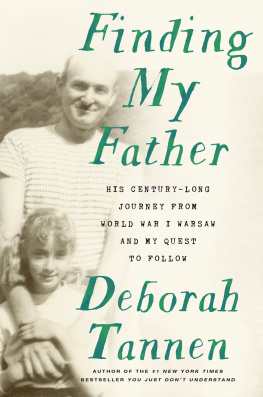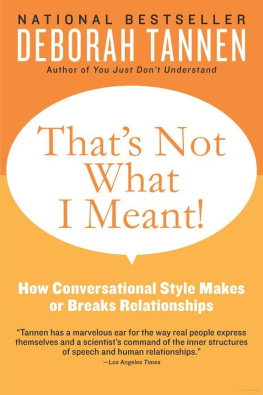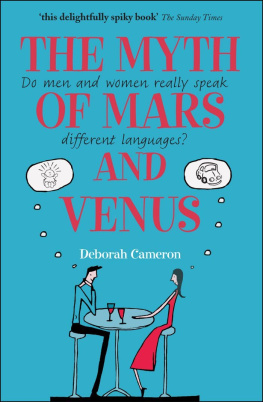Deborah Tannen - You Just Don’t Understand: Women and Men in Conversation
Here you can read online Deborah Tannen - You Just Don’t Understand: Women and Men in Conversation full text of the book (entire story) in english for free. Download pdf and epub, get meaning, cover and reviews about this ebook. year: 1990, genre: Science. Description of the work, (preface) as well as reviews are available. Best literature library LitArk.com created for fans of good reading and offers a wide selection of genres:
Romance novel
Science fiction
Adventure
Detective
Science
History
Home and family
Prose
Art
Politics
Computer
Non-fiction
Religion
Business
Children
Humor
Choose a favorite category and find really read worthwhile books. Enjoy immersion in the world of imagination, feel the emotions of the characters or learn something new for yourself, make an fascinating discovery.
- Book:You Just Don’t Understand: Women and Men in Conversation
- Author:
- Genre:
- Year:1990
- Rating:4 / 5
- Favourites:Add to favourites
- Your mark:
- 80
- 1
- 2
- 3
- 4
- 5
You Just Don’t Understand: Women and Men in Conversation: summary, description and annotation
We offer to read an annotation, description, summary or preface (depends on what the author of the book "You Just Don’t Understand: Women and Men in Conversation" wrote himself). If you haven't found the necessary information about the book — write in the comments, we will try to find it.
You Just Don’t Understand: Women and Men in Conversation — read online for free the complete book (whole text) full work
Below is the text of the book, divided by pages. System saving the place of the last page read, allows you to conveniently read the book "You Just Don’t Understand: Women and Men in Conversation" online for free, without having to search again every time where you left off. Put a bookmark, and you can go to the page where you finished reading at any time.
Font size:
Interval:
Bookmark:
YOU JUST DONT UNDERSTAND
Women and Men in Conversation
Deborah Tannen, Ph.D.
Ballantine Books New York
Copyright 1990 by Deborah Tannen, Ph.D.
All rights reserved under International and Pan-American Copyright Conventions. Published in the United States by Ballantine Books, a division of Random House, Inc., New York, and distributed in Canada by Random House of Canada Limited , Toronto. This edition published by arrangement with William Morrow and Company, Inc.
Ann Landers s col umn reprinted with permission of Ann Landers, Crearors and Los Angeles Times Syndicates.
In the Crook of His Neck from Cirdin g H o me , copyright 1989 by Cheryl RomneyBrown. Reprinted by permission.
Excerpts from The Whistle Blowers Mornin g After, copyright 1986 by The New York Times Company. Reprinted by permission.
Excerpts from Fear of Flying by Erica Jong, copyright 197 by Erica Mann Jong. Reprinted by permission of Henry Holt and Company , In c.
Excerpt from The Accidental Tourist by Anne Tyler, copy right 1985 by Anne Tyler Modarressi. Reprinted by permission of Alfred A. Knopf, Inc.
Ex ce rpts from Sc e nes from a Marriage by Ingmar Bergman , translated by Alan Blair, English translation copyr i ght 1974 by Alan Blair. Reprinted by permission of Pantheon Books, a division of Random House , Inc.
Excerpts from In a Different V o ice by Carol Gi lligan , copyright by Carol Gilligan. Reprinted by permission of the author and Harvard University Press. All ri ghts reserved.
Ex ce rpts from Youre Ugly Too by Lorrie Moore, copyright 1989 by Lorrie Moore. Reprinted by permission. Originally published in The New Yorker.
Excerpts from Volpone by Jane Shapiro, copyright 1987 by Jane Shapiro. Reprinted by permission . Originally published in The New Yorker.
Excerpts from Gr ow n Ups, copyright by Jules Feiffer. Used by permission of The Lantz Company.
Library of Congress Catalog Card Number: 90-9519
ISBN : 0-45-7205-0
Cover design by James R. Harris Cover photograph by Marcia Lippman
Manufactured in the United States of America
First Ballantine Books Edition: June 1991
20 19 18 17 16 15 14
TO MY FATHER AND MOTHER SOURCE AND SUSTENANCE
No usual thanks are sufficient to acknowledge my debt to the generous colleagues who read drafts of this book and improved it with their comments. For these gifts of time and attention, I am grateful to A. L. Becker, Penelope Eckert, Ralph Fasold, Michael Geis, Karl Goldstein, Robin Lakoff, Neal Norrick, Susan Philips, Naomi Tannen, Barrie Thorne, and David Wise. My debt to Robin Lakoff goes further back. The pioneer in linguistic research on language and gender, she provided a starting point for me, and for a generation of scholars, by blazing a trail that has since branched into many diverging paths of inquiry. Her course at the 1973 Linguistic Institute largely inspired me to become a linguist and to choose as my training ground the University of California, Berkeley, where she was one of my teachers. She has remained a friend, a generous supporter, and a model of a scholar who pursues theoretical research without losing sight of its practical implications. My gratitude to Ralph Fasold is also far ranging. He has been a continuing and cherished source of intellectual support and challenge, engaging me in dialogue on my research and offering illuminating perspectives, examples, and sources from his ownas well as invaluable computer consulting. I am grateful to Georgetown University for providing me with this perfect colleague and friend. Also at Georgetown, I thank James Alatis, dean of the School of Languages and Linguistics; my colleagues in the sociolinguistics program; and the students who have listened and contributed to my developing ideas. Many others were helpful in vital ways, including reading and commenting on parts of drafts, giving examples from their own experience, or discussing ideas with me. Although I list them together, each persons contribution is individually appreciated: Katherine Abramovitz, Steve Barish, Niko Besnier, Tom Brazaitis, Bruce Brigham, Marjorie Brigham, Penelope Brown, Jocelyn Burton, Caroline Celce-Murcia, Andrew Cohen, Bronwyn Davies, Bambi Evans-Murray, Paul Friedrich, Allen Furbeck, Jim Garofallou, John Goldsmith, Paul Goldstein, Marjorie Harness Goodwin, John Guarnaschelli, Annie Hawkinson, Ray Hays, Paul Hopper, Deborah James, Christina Kakava, Judith Katz-Schwartz, Carolyn Kinney, Mark Kohut, Helen Kotsonis, Addie Macovski, Joseph Mahay, Alan Marx, Rachel Myerowitz, Susie Napper, Myriam Nastase, Mandana Navid-Tabrizi, Rebekah Perks, Molly Peterson, PuaPua Ponafala, Dennis Preston, Lucy Ray, Dan Read, Chuck Richardson, Celia Roberts, Joanna Robin, Elif Rosenfeld, Cynthia Roy, Pamela Saunders, Deborah Schiffrin, Gail Schricker, Tom Schricker, Amy Sheldon, Wendy Smith, Kyong Sook Song, Carol a Sprengel, Jana Staton, Dorothy Tannen, Eli Tannen, Gary Weaver, Bob Webb, Etsuko Yamada, and Haru Yamada.
I thank Bruce Dorval for the opportunity to analyze his videotapes and transcripts of friends talking and for permission to use excerpts from them. I also thank Suzanne Gluck, who is everything anyone could wish for in an agent and more, and the entire staff of William Morrow and Company, but especially my editor, Maria Guarnaschelli, who has believed passionately in the book from its inception and has lavished on it her boundless enthusiasm and energy.
To my husband, thank you for everything.
Each persons life is lived as a series of conversations. Analyzing everyday conversations, and their effects on relationships, has been the focus of my career as a sociolinguist. In this book I listen to the voices of women and men. I make sense of seemingly senseless misunderstandings that haunt our relationships, and show that a man and a woman can interpret the same conversation differently, even when there is no apparent misunderstanding. I explain why sincere attempts to communicate are so often confounded, and how we can prevent or relieve some of the frustration. My book Thats Not WhatI Meant! showed that people have different conversational styles. So when speakers from different parts of the country, or of different ethnic or class backgrounds, talk to each other, it is likely that their words will not be understood exactly as they were meant. But we are not required to pair off for life with people from different parts of the country or members of different ethnic groups, though many choose to. We are expected to pair off with people of the other gender, and many do, for long periods of time if not for life. And whereas many of us (though fewer and fewer) can spend large portions of our lives without coming into close contact with people of vastly different cultural backgrounds, few peoplenot even those who have no partners in life or whose primary relationships are with same-sex partnerscan avoid close contact with people of the other gender, as relatives and co-workers if not as friends. Thats Not What I Meant! had ten chapters, of which one dealt with gender differences in conversational style. But when I received requests for interviews, articles, and lectures, 90 percent wanted me to focus on 10 percent of the bookthe chapter on male-female differences. Everyone wanted to know more about gender and conversational style.
I too wanted to find out more. Indeed, I had decided to become a linguist largely because of a course taught by Robin Lakoff that included her research on gender and language. My first major linguistic study was of gender and cultural differences in indirectness, and I was fairly familiar with others research on the topic. But although I had always inhabited the outskirts of gender research, I had not leaped into its inner circle, partly because the field is so controversial.
Next pageFont size:
Interval:
Bookmark:
Similar books «You Just Don’t Understand: Women and Men in Conversation»
Look at similar books to You Just Don’t Understand: Women and Men in Conversation. We have selected literature similar in name and meaning in the hope of providing readers with more options to find new, interesting, not yet read works.
Discussion, reviews of the book You Just Don’t Understand: Women and Men in Conversation and just readers' own opinions. Leave your comments, write what you think about the work, its meaning or the main characters. Specify what exactly you liked and what you didn't like, and why you think so.

